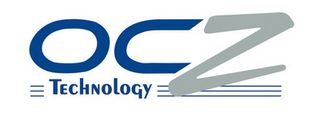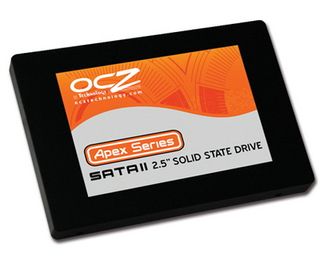OCZ Releases New 2.5-inch Apex SSDs
OCZ, one of the world leaders in memory technology, enters the ring with its new Apex SATA II 2.5-Inch Solid State Drive(SSD) series.

Lately solid state drives are slowly beginning to enter the market place from every corner. Now OCZ brings its faithful customers (and everyone else) a super-speed alternative to the standard, mechanically spinning platters. You got a need for speed? Maybe it is time to look towards what is going to inevitably be the next mainstream storage solution.
Quoting Eugene Chang, the director of product management over at OCZ Technology Group: “As the adoption of SSD drives continues to ramp, it is our goal to enable everyday consumers to take advantage of the benefits of solid state drives. The new Apex Series is positioned at the center of our lineup and features an updated controller and internal RAID design to deliver superior performance to mainstream consumers at a very aggressive price.”
The new 2.5-inch Apex drives are targeted more towards the mobile user, although there is nothing stating that you cannot use these drives in desktop systems. They will benefit mobile users noticeably, due mostly in part to their lowered power consumption over standard mechanical Hard Disk Drives(HDD). Extending battery life is something that every mobile user is looking for.
The Apex drives use an internal RAID 0 architecture – meaning that the drive is actually in two halves internally and uses a RAID 0 technique to combine the two halves to increase performance at a much lower cost (since manufacturers are not as hard pressed to use extremely high-end memory inside). You could, if you wanted to, physically RAID 0 two of these drives in the standard fashion as well.
OCZ Apex series drives are built very durable and lightweight, utilizing an external alloy housing. The fact that SSDs have no moving parts by way of synthetic nature, they are far more durable as it is, making them a logical upgrade for mobile users. These Apex drives also sport a 1.5 million hour Mean Time Between Failure (MTBF) – that’s a lot of hours, even when compared to high-end mechanical enterprise drives.

Capacities are currently available in 60GB, 120GB, and 250GB flavors. Here is a list of part numbers direct from OCZ Technology Inc.
Stay On the Cutting Edge: Get the Tom's Hardware Newsletter
Get Tom's Hardware's best news and in-depth reviews, straight to your inbox.
Apex 60GB – OCZSSD2-1APX60G
Apex 120GB – OCZSSD2-1APX120
Apex 250GB – OCZSSD2-1APX250G
OCZ also warns on their info page that “Solid State Drives DO NOT require defragmentation. It may decrease the lifespan of the drive.”
This is nothing to actually be overly concerned about as the theoretical re-write limits for each sector in a Solid State Drive are going to outlive the use of the drive. It is just that defragmenting (although not necessary) creates an excessive amount of write cycles on any drive. Solid State Drives are designed so that data is written evenly to all sectors – this is what the industry refers to as “Wear Leveling.” So feel free to fill your drive full of random data just so you can see how fast it defrags for kicks; you will not harm anything, but do not do it on a regular basis unless you want to lower the MTBF of the drive down to mechanical HDD standards.
-
nekatreven "So feel free to fill your drive full of random data just so you can see how fast it defrags for kicks; you will not harm anything, but do not do it on a regular basis unless you want to lower the MTBF of the drive down to mechanical HDD standards."Reply
As pointless as that would be...if you choose to do it for grins, be sure not to completely fill the drive. Leave ~20% free. Defrag moves files around, thats obviously the point. So if you fill the ssd it can't move files using the ssd only (thats if it runs defrag at all, as I'm not sure it will use swap space).
:)
Most Popular






